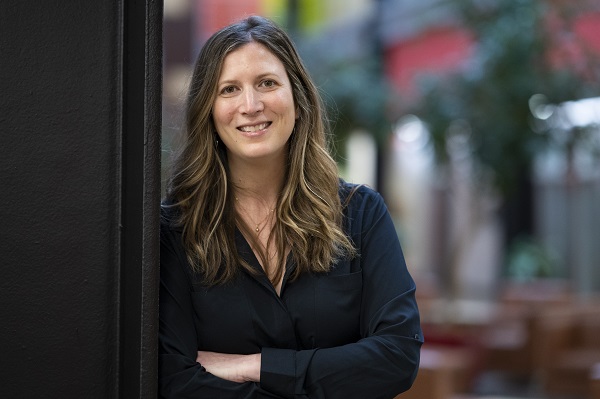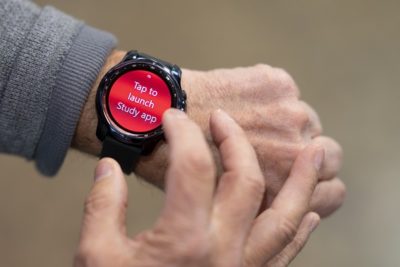
By Michele Sponagle
Dr. Marla Beauchamp feels fortunate to be leading a first-of-its-kind study looking at how technology can help older adults with their mobility – a vital health indicator. Called McMaster Monitoring My Mobility – or MacM3 for short – the AGE-WELL-funded study is now underway and recruiting as many as 2,000 participants ages 65 to 80.
Before Dr. Beauchamp became an AGE-WELL researcher and associate professor, CRC (tier 2), Mobility, Aging, and Chronic Disease, at McMaster University in Hamilton, Ontario, she earned a master’s degree in physical therapy at the University of Toronto. As part of her studies, she did a placement working with older people. It marked an important step in a career devoted to supporting healthy aging. Her pursuit is personal to a degree.
“I was very close to my grandparents, so that’s part of it,” she says. “I also appreciate the wealth of experience that older people share. I think about how they’ve contributed their whole lives – and wonder how we can help people to live independently for longer. I saw how important that was to my grandparents and it’s what interested me about physiotherapy and rehabilitation. It is the lens that I bring to my research.”
For the MacM3 study, Dr. Beauchamp and her co-leads from disciplines spanning geography, social science and mathematics, have created a smartwatch app that participants wear for 10-day intervals every four months throughout the two-year study. Information collected includes step count, mode of travel, distance travelled and activity intensity. Everything is encrypted for privacy. This is in conjunction with GPS and additional health measures, such as in-person assessments, quarterly phone calls and monthly diaries.
Currently, there is no wearable that comprehensively monitors mobility and that is valid for predicting important health outcomes in older adults. Problems with everyday mobility, such as walking, getting in and out of a car, and driving, are common with aging and can negatively affect health and wellbeing. During consultations with older adults and caregivers, there was a clear interest in using wearable tracking devices to self-monitor mobility.
To date, study participants are from the Hamilton area. Recruitment will soon begin in Toronto through a partnership with the McMaster Institute for Research on Aging | Dixon Hall Centre.

Preventing or delaying mobility problems
With the data gathered in the study, machine learning and advanced statistical methods will be used to identify trajectories of change in mobility over time and how these trajectories relate to health outcomes, such as falls. With input from older adults and caregivers, the ultimate goal is to develop a mobility self-monitoring tool that can help prevent or delay mobility problems in later life through early detection and treatment.
The MacM3 study addresses a gap in mobility research. “While there have been studies looking at how fast people can get in and out of a chair and how fast someone walks, current mobility research doesn’t address how mobility is something to take charge of as a central strategy for managing your health,” says Dr. Beauchamp. “We go to a doctor who takes measurements, like blood pressure and BMI, yet there’s no measurement of mobility – something that we value so much. It’s an indicator of our overall wellbeing and a future predictor of falls and hospitalization. Examining someone’s mobility is an opportunity for early intervention and information sharing.”
Irene Schieberl is one of the study participants. The 80-year-old Hamilton resident was keen to take part. “I have participated in a few different studies conducted by McMaster,” she says. “I would like to help the senior population in any way I can to keep us healthy and in our homes as long as possible because that’s less expensive for the health-care system. This is a way for me to give back.”
Schieberl also thought it was a good chance to understand more about her own mobility. She has a life-long passion for dancing, everything from tap to Hawaiian and jazz, and performing – something she hasn’t been able to do throughout the COVID pandemic. “I needed a way to get motivated and to improve my strength and stamina,” the mother of two explains. “During my exercise pre-tests at the McMaster Innovation Park, I was able to see how good my balance, endurance and strength were and get a benchmark for my current mobility.”
For Michael Kasoian, being involved in the study and wearing a smartwatch to track his movements is a way to monitor how his mobility will change over the next 24 months. The retired elementary school principal who lives in Burlington considers himself to be a very healthy 73-year-old – one who keeps fit by playing pickleball, walking and golfing. “When you get to be my age, you know things are going to change,” he says. “I am interested in anything that can keep me as active as I can be.”
Over the course of the study, participants will send in monthly postcards to report falls, wear their smartwatches and an optional activity device on their thighs, and do a fitness test that will compare where they started physically and where they ended up two years later. They are asked to live normally throughout the study, keeping their normal level of activity and maintaining their current diets to get the most accurate assessment of their progress.
AGE-WELL ‘a perfect fit’
Before recruiting participants and equipping them with wearable devices, Dr. Beauchamp and colleagues worked with talented software developers to develop the specific technology that would gather the data and analyze it. The result was the Ivy app to collect the information through a smartwatch, and an app called Clover, which downloads and processes that data. “We had to develop the software and heavily test it – all during COVID,” she explains. “Before we actually started our study, there was a lot of preparation that went into it.”
Dr. Beauchamp credits the support received from AGE-WELL (Canada’s technology and aging network) with getting things moving by providing core research funding. “It was a perfect fit, not just for the funding, but for the opportunity to work with a partner,” she says. “It has been phenomenal. Everyone involved in MacM3 is really excited about it.”
Dr. Beauchamp also acknowledged the McMaster Institute for Research on Aging (MIRA) as co-funder of MacM3.
She adds: “I’m lucky to have found an area of research that I am really passionate about. What I do doesn’t feel like work. It just feels like something I want to do and was meant to do.”
To join the MacM3 study or learn more, visit: https://macm3.com/
Michele Sponagle is an editor, writer and content manager. AGE-WELL is a federally funded Network of Centres of Excellence. The pan-Canadian network brings together researchers, older adults, caregivers, partner organizations and future leaders to accelerate the delivery of technology-based solutions for healthy aging. agewell-nce.ca

